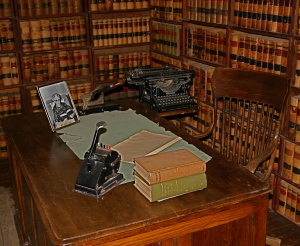It’s time for a conference of lexicographers to convene at a long teakwood table to construct a new form of writing notation—one that is more specific—that conveys more emotion than our current system.
It should be a combination of the words we now use—but with a simple addition—symbols that assist in conveying the passion, the sentiment, or the abject fear we want the reader to grasp. A combination of the written word and an equivalent to musical notation would be ideal. “Lexicusical” language—lexicusicalism.
The musician, reading sheet music, knows when a certain passage should be very soft (pianissimo), soft (piano), or loud (forte)—played with a slow tempo (adagio) or a fast one (allegro). An author writing a cops-and-robbers novel may want the reader to intuit that the policeman and the criminal he’s pursuing both begin to run faster. Rather than writing, The jewel thief began to run faster; the detective kept pace—notation would accomplish this. Accelerando is musical notation indicating: to gradually quicken tempo. So a counterpart to musical notation could be employed—perhaps a tilde incorporated into the text: Their ˜ feet scuffed and scratched ˜ through the dark city streets.
Economy of words is a technique authors use to keep the reader moving along with the action. The reader’s respiration should increase—his muscles should tense—as the pursuer and pursued quicken the chase. Awkward phrases of explanation serve only to make the reader stumble. And, as it’s considered a major literary triumph to cause a reader to suffer a heart attack, the writing must be perfectly executed.
A well-designed system of notation could be helpful in many situations—most especially, I think, with adjectives.
Lexicusicalism would allow a writer to convey a certain character’s revulsion without having to explain that: The earl guffawed in a manner that caused his listener to lurch backward, fearing that the golf ball-sized glob of phlegm that was surely forthcoming would no doubt stain his cravat.
This passage could be written thus: The earl coughed  . The viscount departed posthaste.
. The viscount departed posthaste.
***
It’s all related to pitch—like listening to an uptalker (the person who ends every sentence with a question mark?) Thank you all for coming today? I’ve completed the report that Bob Forapples asked me to compile? Many of you already know this, and the company’s stock is at twenty-five cents per share? (The only thing worse is when this person manages to sprinkle in a bunch of likes, ums, and ya knows.) And I’m pretty sure, um, we all find it, like, extremely annoying, ya know, when the, um, seventeen-year-old behind the counter is, like, um, twirling her gum and, ya know, talking on the phone at the same time? ’Cuz that’s, ya know, how when you’re, like, at Cold Stone Creamery, you end up with, um, meatloaf on your, um, vanilla ice cream?
***
I don’t have a solution to the meatloaf on your ice cream (other than a good smack upside the head—and that includes the parents), but I do have more suggestions for lexicusical language:
Perplexity or puzzlement are often expressed with a scrunching of the eyes—or a scratching of the head. The detective rounded the corner. The streets were empty; his quarry had vanished. (This is typically where the detective’s eyes would scrunch up, and the author would write: His eyebrows arched as he tried to work it out. Where had the thief gone?) But a symbol, following the period at the end of the sentence could indicate the detective’s bewilderment: … his quarry had vanished. § No further explanation required.
Anger—Yes, we have the exclamation point, but true rage requires something more powerful … potent … forceful! One of these! ‡
Rather than writing: “Oh, maaaaan” to draw out the word, a slur such as those used to tie notes in music together could suffice. Or enclosing the word like this: “∫Weeeee∫ doggies, Jethro!” would indicate an ascending pitch.
There are many others: facetiousness; sarcasm; loneliness; laziness.
***
Or … how about “Lexicolorism”.
The aforementioned objective could be accomplished with the use of colored text. In the olden days, when refined women in feathered hats sat at “those new typewriting contraptions”, this would have been impractical,
but today we have computers with “millions” of colors—and, for those who still occasionally need to make use of quill and papyrus, there are pens that write with pink ink.
So here’s what it would look like:
Rage: He picked up the gun, pointed it at the, um, other guy’s face and screamed, “You betrayed me!”
A condescending chuckle aimed at an equally obtuse know-it-all at a dinner party: “I really don’t think you understand anything about how the occurrence of efflorescence or the formation of filamentous bioglobules in microchannels can affect the specific-flow configurations of meatloaf—or ice cream, for that matter.”
A dry, raspy throat: “These pretzels are making me thirsty.”
Nasally voice: “What’llitbe, hon?”
Nervous voice: “Honest, boss, I tawt da sacka jewels would be safe inda Mariana Trench.”
A ditzy blonde with a squeaky voice: “I caaaan’t staaaan da way day treet me hea! I quit!”
***
I caaaaan’t undastand why no wun haz evva thawta this.


